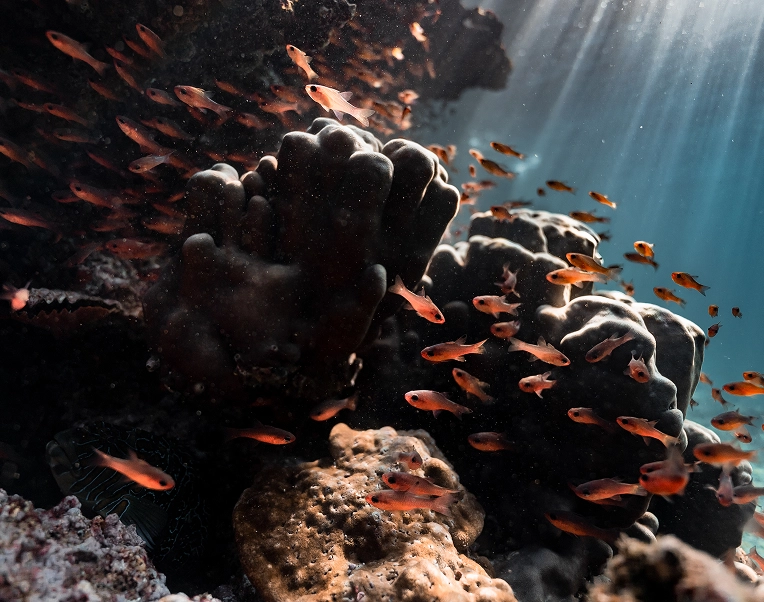Photo: Hammerheads Darwin Jonathan
El Laboratorio de Ecología Marina del GSC se enfoca en estudios ecológicos, biológicos y genéticos de especies marinas que habitan tanto el mar abierto como las zonas intermareales de Galápagos. Nuestra investigación abarca desde comprender la base de la cadena alimentaria bajo condiciones oceanográficas cambiantes hasta conservar especies migratorias como tiburones, tortugas marinas y cetáceos — y enfrentar amenazas globales como la contaminación por plásticos.
Comprendiendo la vida en tierra en Galápagos
Foto: Joshua Vela

Explorando el océano, protegiendo su vida
En nuestro Laboratorio de Ecología Marina se llevan a cabo una variedad de proyectos que abarcan desde productividad primaria hasta megafauna marina.
Por ejemplo, el Dr. Adrian Marchetti (UNC) estudia las aguas de Galápagos para comprender mejor los efectos de las condiciones oceanográficas base, eventos de El Niño y los impactos del cambio climático en la producción de fitoplancton en toda la Reserva Marina de Galápagos.
Foto: Alexander Custer
La investigación también es realizada por la Dra. Maggy Brandt (USFQ) y sus colaboradores Dr. Mike Kingsford (James Cook University) y Dr. John Bruno (UNC) en el mesocosmos de acuario del GSC, donde pueden controlar y modificar parámetros del agua de mar para identificar cambios a largo plazo en el ecosistema y la fauna causados por el cambio climático.
Foto: Carlos Gavela
Existen también muchos proyectos enfocados en mejorar la comprensión de especies marinas migratorias, como las investigaciones del Dr. Alex Hearn (USFQ) sobre tiburones, así como el trabajo de Daniela Alarcón (GSC) y Juan Pablo Muñoz (USFQ) con tortugas marinas y cetáceos. Todo esto proporciona información valiosa para apoyar la creación de políticas que establezcan corredores marinos protegidos para estas importantes especies.
Finalmente, realizamos investigación para comprender mejor las principales amenazas a los océanos y las especies que los habitan. Por ejemplo, Juan Pablo Muñoz (USFQ) ha estado investigando y generando conciencia sobre el problema global de la contaminación por plásticos, destacando la necesidad de cambiar nuestros hábitos de consumo para preservar nuestro ecosistema.
Photo:
Sala fría para almacenamiento de muestras
Espacio de oficina
Equipo de buceo
Terraza para experimentos externos
Sala de necropsia
Área de sistema de mesocosmos experimental
Photo:
El Laboratorio de Ecología Marina cuenta con una sala fría para almacenamiento de muestras, equipo de buceo, sala de necropsia y terraza para experimentos externos.
Bomba de vacío
Congelador portátil DOMETIC
Bomba de agua salada
Zodiac
Radios Nautilus
Horno mufla
Tanques de buceo
Agitador magnético
Congelador ultra-bajo −80 °C
CastAway CTD
Centrífuga PCL series
Balanza analítica OHAUS
Estereomicroscopio Olympus y MGC-10
MCMURDO Smartfind S20
IsatPhone — teléfono satelital
Generador YAMAHA ef2600
Motor fuera de borda YAMAHA
Foto: Greenpeace
Únete a nuestra misión

In 2022, the Galapagos Science Center (GSC) and the broader UNC & USFQ Galapagos Initiative will celebrate its 10th Anniversary. We are proud to announce the World Summit on Island Sustainability scheduled to be held on June 26–30, 2022 at the Galapagos Science Center and the Community Convention Center on San Cristobal Island.
The content of the World Summit will be distributed globally through social media and results documented through papers published in a book written as part of the Galapagos Book Series by Springer Nature and edited by Steve Walsh (UNC) & Carlos Mena (USFQ) as well as Jill Stewart (UNC) and Juan Pablo Muñoz (GSC/USC). The book will be inclusive and accessible by the broader island community including scientists, managers, residents, tourists, and government and non-government organizations.
While the most obvious goal of organizing the World Summit on Island Sustainability is to celebrate the 10th Anniversary of the GSC and the UNC-USFQ Galapagos Initiative, other goals will be addressed through special opportunities created as part of our operational planning of the World Summit.
For instance, we seek to elevate and highlight the Galapagos in the island conservation discourse, seeking to interact with other island networks in more obvious and conspicuous ways to benefit the Galapagos Islands, the UNC-USFQ Galapagos Initiative, and the world. We will seize the opportunity to further develop the I2N2 – International Islands Network-of-Networks. Further, we wish to highlight and emphasize multiple visions of a sustainable future for the Galapagos Islands and we cannot do this alone. Therefore, engaging the Ecuadorian Ministry of Environment, the Ministry of Tourism, the Government Council of Galapagos, the Galapagos National Park, and local Galapagos authorities, including government and non-government organizations and local citizen groups, is imperative.

Borrowing from Hawaii’s and Guam’s Green Growth Program and the Global Island Partnership, we wish to examine existing global programs that emphasize island sustainability and their incorporation into life, policies, and circumstances in the Galapagos Islands. We will also seek to enhance our connections with the institutional members of our International Galapagos Science Consortium and expand the Consortium through the recruitment of other member institutions. We will also work to benefit islands and their local communities by working with citizen groups as well as important NGOs who seek to improve the natural conditions in the Galapagos and diminish the impact of the human dimension on the future of Galapagos’ ecosystems.
Lastly, we will use the World Summit to benefit UNC & USFQ and our constituencies through a strong and vibrant communication plan about the World Summit, creating corporate relationships as sponsors, identifying funding goals through donors, and benefiting our study abroad program for student engagement in the Galapagos Islands. We plan to develop and issue a Galapagos Sustainability Communique after the World Summit that includes the vision and insights of all its participants for a sustainable Galapagos with applicability to global island settings.
We are eager to hear your perspective and have you join us at the World Summit on Island Sustainability!